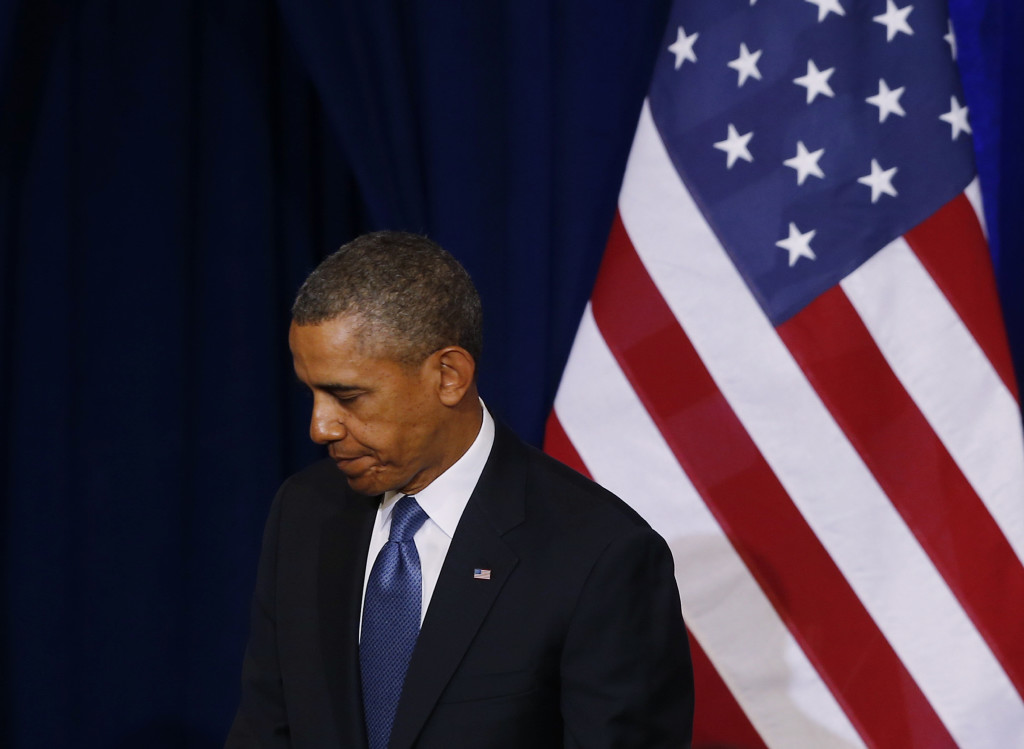Obama on Mass Government Surveillance, Then and Now

May 13, 2014
Share
On the campaign trail in 2008, Barack Obama promised to preside over the most transparent administration in U.S. history. “No more secrecy,” he said. “That is a commitment that I make to you.”
As president, however, Obama has embraced many of the same domestic surveillance programs he once derided as a candidate. For the one-time constitutional law professor, the shift has been particularly striking. Here is a brief history:
2004 — The Race for the U.S. Senate
Obama, campaigning for Senate, begins to address questions about the intersection of national security and privacy. He takes aim at the Patriot Act for “violating our fundamental notions of privacy,” and tells the Democratic National Convention, “We don’t like federal agents poking around our libraries.”
2005 — Obama the Critic
As a senator, Obama focuses on reining in government surveillance. In 2005, he sponsors a bill to make it harder for federal agents to use a special type of subpoena, known as a national security letter, to obtain business records without a court order.
That same year, he joins Democrats to press for additional civil liberties protections in a vote to extend the Patriot Act. The law, he says, “seriously jeopardizes the rights of all Americans and the ideals America stands for.”
2006 — A Vote Against Michael Hayden for the CIA
Obama votes against confirming Gen. Michael Hayden, who as head of the NSA under President George W. Bush, developed the administration’s highly controversial warrantless wiretapping program. Explaining his vote, Obama says:
Americans fought a revolution in part over the right to be free from unreasonable searches — to ensure that our government could not come knocking in the middle of the night for no reason. We need to find a way forward to make sure we can stop terrorists while protecting the privacy and liberty of innocent Americans.
2007 — A Promise on the Road to the White House
By 2007, Obama is campaigning for the White House and making government transparency a central part of his platform. He tells an audience in Washington that the Bush administration “puts forward a false choice between the liberties we cherish and the security we provide.”
As president, Obama says, he will provide U.S. intelligence agencies the tools they need to defeat terrorists without undermining the Constitution. “That means no more illegal wiretapping of American citizens. No more national security letters to spy on citizens who are not suspected of a crime … No more ignoring the law when it is inconvenient.”
July 2008 — A Vote for the FISA Amendments Act
Seeking to enhance his national security credentials amid a close race for president, Obama votes for a law expanding the government’s ability to eavesdrop on communications inside the U.S. without obtaining a specific warrant for each case.
The measure includes a controversial provision granting legal immunity to phone companies that participated in the NSA’s wiretapping program. The vote comes just months after an Obama spokesman told Talking Points Memo, “To be clear, Barack will support a filibuster of any bill that includes retroactive immunity for telecommunications companies.”
2010 — Keeping the Power to Seize Records
In an early move as president, Obama signs a one-year extension for several controversial elements of the Patriot Act. Among the provisions renewed is Section 215, which allows the government to petition the Foreign Intelligence Surveillance Court to compel businesses — such as Verizon — to hand over customer records.
2011 — Patriot Act Is Renewed Again, with an “Autopen”
The president again renews the Patriot Act, offering a new lifeline to several controversial elements of the law, including Section 215; the use of “roving wiretaps”; and the so-called “lone-wolf” provision, which allows for surveillance of individuals with no known ties to a terrorist organization.
Obama is traveling in Europe as the law is set to expire, so he directs the bill be signed into law by a mechanical autopen. Administration officials say it is the first time in history that a president has used a mechanical signature to turn a bill into law.
2012 — An Extension for the FISA Amendments Act
Obama signs a five-year extension of the FISA Amendments Act, the same law he once threatened to filibuster as a senator. The extension is approved despite a failed push in the Senate for more oversight and public disclosure. Later in the year, he tells Jon Stewart on The Daily Show (apx. 27 seconds into the video below) that the administration had “modified” Bush-era surveillance practices and put “safeguards in place that weren’t there before.”
June 5, 2013 — NSA Spying Under Obama is Exposed
The Edward Snowden revelations begin to come out. The Guardian reports that for the first time under the Obama administration, the telephone communications records for millions of Americans “are being collected indiscriminately and in bulk — regardless of whether they are suspected of any wrongdoing.” The next day, Barton Gellman and Laura Poitras report in The Washington Post that the NSA is tapping into the central servers of nine leading U.S. Internet firms, “extracting audio and video chats, photographs, e-mails, documents, and connection logs.”
June 7, 2013 — Obama Responds to the Snowden Leaks
The president makes his first public statement on the Snowden leaks, saying the telephone records program “is fully overseen not just by Congress, but by the FISA Court.” No one, he says, “is listening to the content of people’s phone calls.” Obama admits to having had “a healthy skepticism” about the surveillance programs he inherited as president, but ultimately concluded that they helped prevent terrorist attacks.
“It’s important to recognize that you can’t have 100 percent security and also then have 100 percent privacy and zero inconvenience,” he says. “We’re going to have to make some choices as a society.”
Jan. 17, 2014 — A Call for Reform
Obama outlines reforms for the NSA’s telephone metadata program “as it currently exists.” Critics “are right to point out that without proper safeguards, this type of program could be used to yield more information about our private lives, and open the door to more intrusive bulk collection programs in the future,” he says.
Under the White House plan, outlined in March, the phone data would no longer stay in the hands of the NSA. Instead, phone companies would warehouse the data themselves. In order to access it, the government would first need a judge’s permission.

Related Documentaries
Latest Documentaries
Related Stories
Related Stories
Explore
Policies
Teacher Center
Funding for FRONTLINE is provided through the support of PBS viewers and by the Corporation for Public Broadcasting, with major support from Ford Foundation. Additional funding is provided the Abrams Foundation, Park Foundation, John D. and Catherine T. MacArthur Foundation, Heising-Simons Foundation, and the FRONTLINE Trust, with major support from Jon and Jo Ann Hagler on behalf of the Jon L. Hagler Foundation, and additional support from Koo and Patricia Yuen. FRONTLINE is a registered trademark of WGBH Educational Foundation. Web Site Copyright ©1995-2025 WGBH Educational Foundation. PBS is a 501(c)(3) not-for-profit organization.





















